Papers written by Hodgkin, Ernest P. (Doctor, b.1908 - d.1998) - Part 17
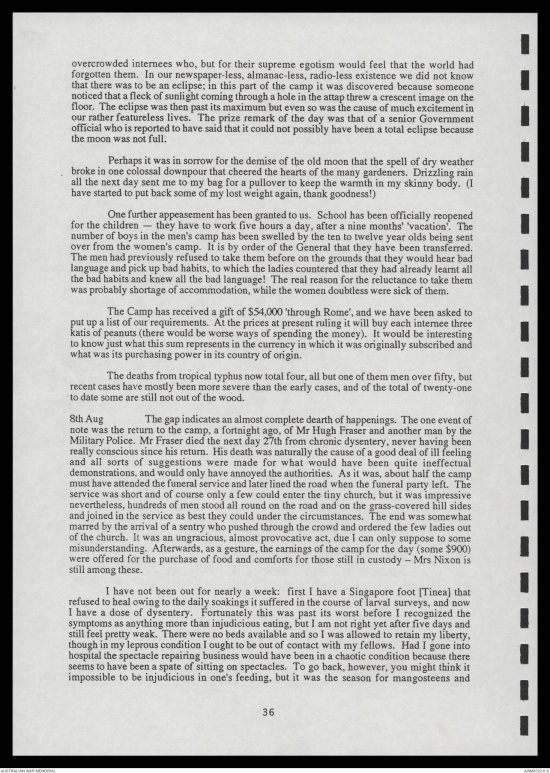
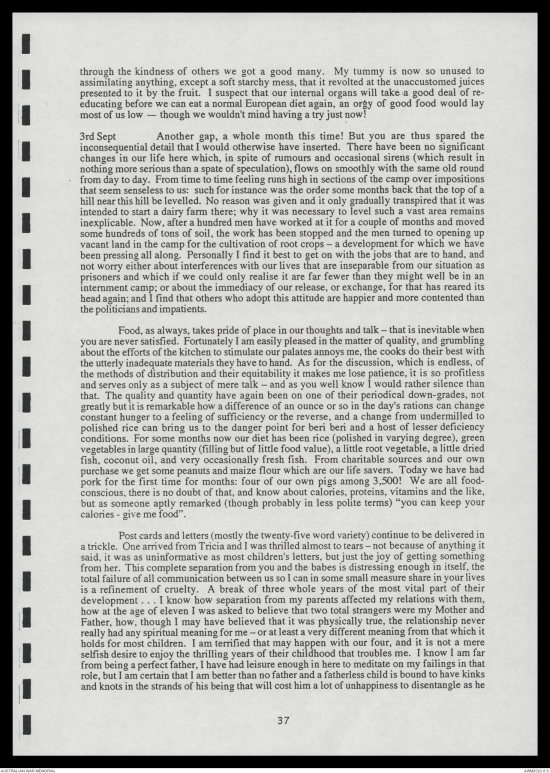
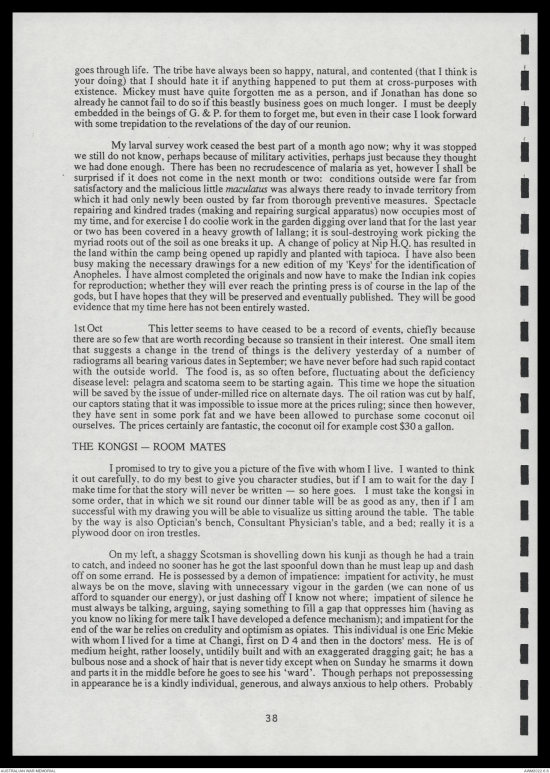
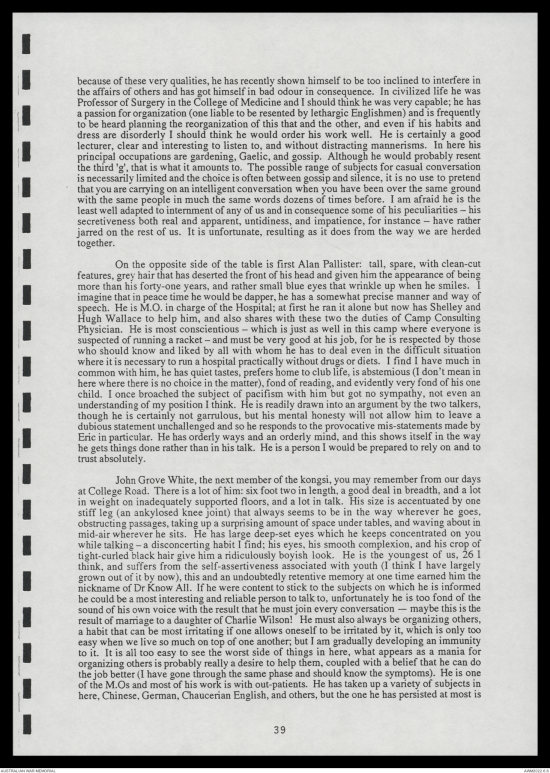
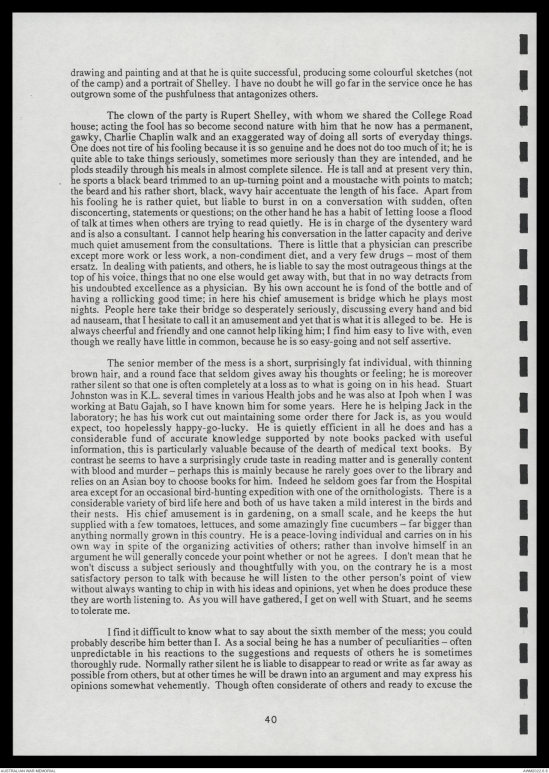
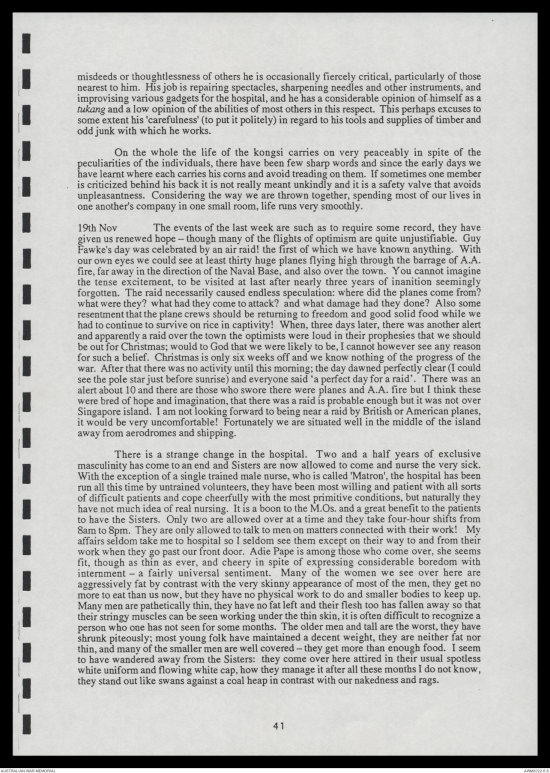
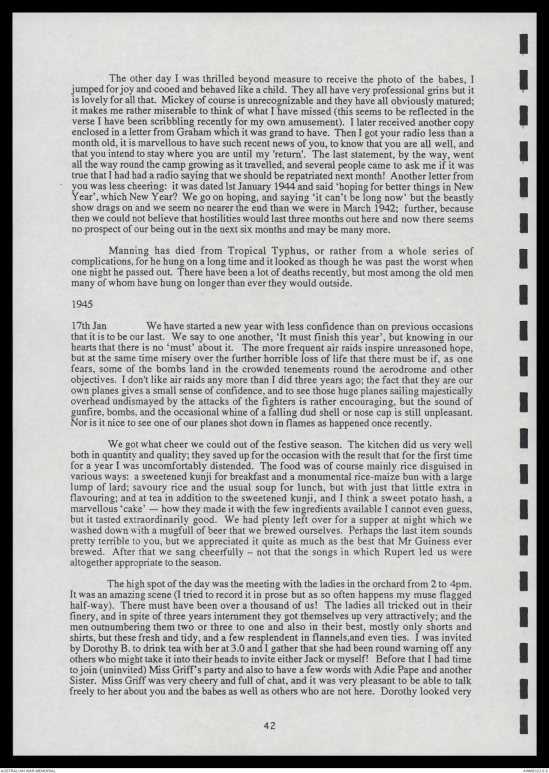
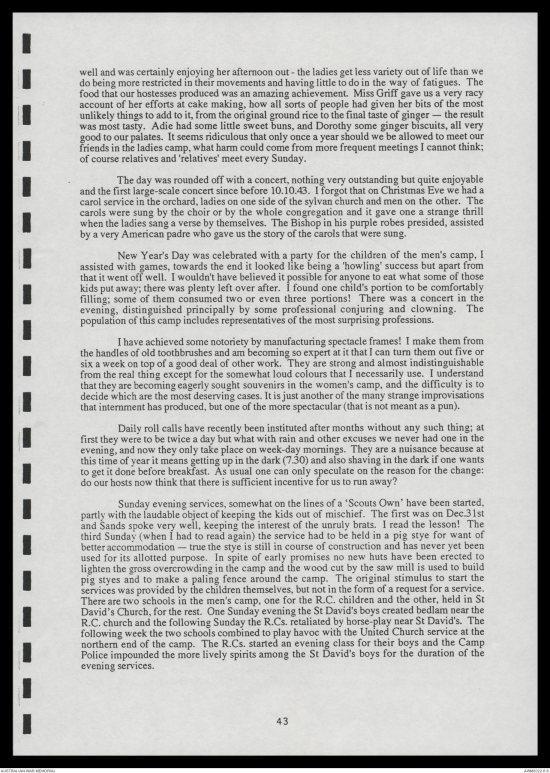
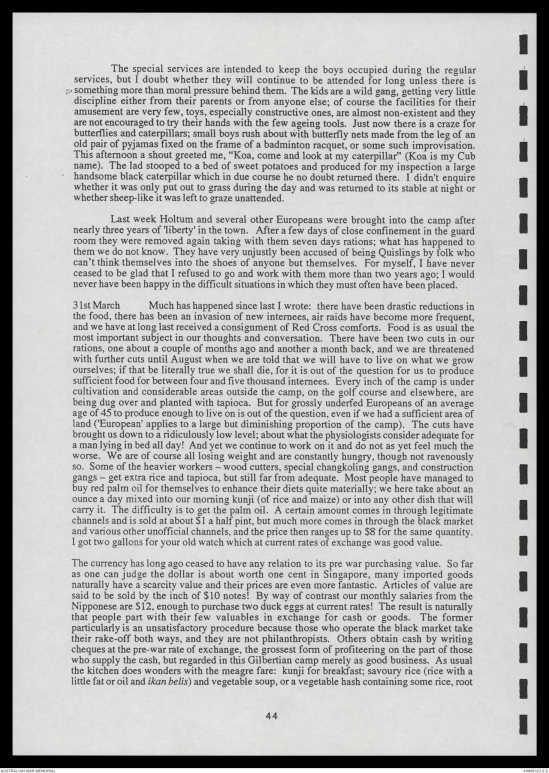
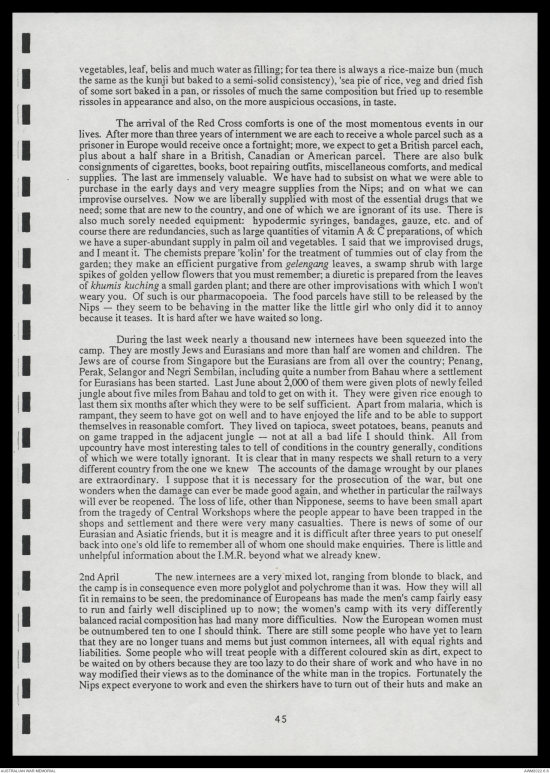
overcrowded internees who, but for their supreme egotism would feel that the world had
forgotten them. In our newspaper-less, almanac-less, radio-less existence we did not know
that there was to be an eclipse; in this part of the camp it was discovered because someone
noticed that a fleck of sunlight coming through a hole in the attap threw a crescent image on the
floor. The eclipse was then past its maximum but even so was the cause of much excitement in
our rather featureless lives. The prize remark of the day was that of a senior Government
official who is reported to have said that it could not possibly have been a total eclipse because
the moon was not full.
Perhaps it was in sorrow for the demise of the old moon that the spell of dry weather
broke in one colossal downpour that cheered the hearts of the many gardeners. Drizzling rain
all the next day sent me to my bag for a pullover to keep the warmth in my skinny body. (I
have started to put back some of my lost weight again thank goodness.!)
One further appeasement has been granted to us. School has officially reopened
for the children — they have to work five hours a day, after a nine months 'vacation'. The
number of boys in the men's camp has been swelled by the ten to twelve year olds being sent
over from the women's camp. It is by order of the General; that they have been transferred.
The men had previously refused to take them before on the grounds that they would hear bad
language and pick up bad habits, to which the ladies countered that they had already learnt all
the bad habits and knew all the bad language! The real reason for the reluctance to take them
was probably shortage of accommodation, while the women doubtless were sick of them.
The Camp has received a gift of $54,000 'through Rome', and we have been asked to
put up a list of our requirements. At the prices at present ruling it will buy each internee three
katis of peanuts (there would be worse ways of spending the money). It would be interesting
to know just what this sum represents in the currency in which it was originally subscribed and
what was it purchasing power in its country of origin.
The deaths from tropical typhus now total four, all but one of them men over fifty, but
recent cases have mostly been more severe than the early cases, and of the total of twenty-one
to date some are still not out of the wood.
8th Aug The gap indicates an almost complete dearth of happenings. The one event of
note was the return to the camp, a fortnight ago, of Mr. Hugh Fraser and another man by the
Military Police. Mr. Fraser died next day 27th from chronic dysentery, never having been
really conscious since his return. His death was naturally the cause of a good deal of ill feeling
and all sorts of suggestions were made for what would have been quite ineffectual
demonstrations, and would only have annoyed the authorities. As it was, about half the camp
must have attended the funeral service and later lined the road when the funeral party left. The
service was short and of course only a few could enter the tiny church. but it was impressive
nevertheless, hundreds of men stood all round on the road and on the grass-covered hill sides
and joined in the service as best they could under the circumstances. The end was somewhat
marred by the arrival of a sentry who pushed through the crowd and ordered the few ladies out
of the church. It was ungracious, almost provocative act, due I can only suppose to some
misunderstanding. Afterwards , as a gesture, the earnings of the camp for the day (some $900)
were offered for the purchase of food and comforts for those still in custody — Mrs Nixon is still among these.
I have not been out for nearly a week; first I have a Singapore foot {Tinea} that
refused to heal owing to the daily soakings it suffered in the course of larval surveys, and now
I have a dose of dysentery. Fortunately this was past its worse before I recognized the
symptoms as anything more than injudicious eating, but I am not right yet after five days and
still feel pretty weak. There were no beds available and so I was allowed to retain my liberty,
though in my leprous condition I ought to be out of contact with my fellows. Had I gone into
hospital the spectacle repairing business would have been in a chaotic condition because there
seems to have been a spate of sitting on spectacles. To go back, however, you might think it
impossible to be injudicious in one's feeding, but it was the season for mangosteens and
36
through the kindness of others we got a good many, My tummy is now so unused to
assimilating anything, except a soft starchy mess, that it revolted at the unaccustomed juices
presented to it by the fruit. I suspect that our internal organs will take a good deal of
reeducating before we can eat a normal European diet again, an orgy of good food would lay most of us low — though we wouldn't mind having a try just now!.
3rd Sept Another gap, a whole month this time! But you are thus spared the
inconsequential detail that I would otherwise have inserted. There have been no significant
changes in our life here which, in spite of rumours and occasional sirens (which result in
noting more serious than a spate of speculation), flows on smoothly with the same old round
from day to day. From time to time feeling runs high in sections of the camp over impositions
that seem senseless to us: such for instance was the order some months back that the top of a
hill near this hill be levelled. No reason was given and it only gradually transpired that it was
intended to start a dairy farm there; why it was necessary to level such a vast area remains
inexplicable. Now, after a hundred men have worked at it for a couple of months and moved
some hundreds of tons of soil, the work has been stopped and the men tuned to opening up
vacant land in the camp for the cultivation of root crops — a development for which we have
been pressing all along. Personally I find it best to get on with the jobs that are to hand, and not worry either about interferences with our lives that are inseparable from our situation as
prisoners and which if we could only realise it are far fewer than they might well be in an
internment camp; or about the immediacy of our release or exchange, for that has reared its
head again; and I find that others who adopt this attitude are happier and more contented than
the politicians and impatients.
Food as always, takes pride of place in our thoughts and talk — that is inevitable when
you are never satisfied. Fortunately I am easily pleased in the matter of quality, and grumbling
about the efforts of the kitchen to stimulate our palates annoys me, the cooks do their best with
the utterly inadequate materials they have to hand. As for the discussion, which is endless, of
the methods of distribution and their equitability it makes me lose patience, it is so profitless
and serves only as a subject of mere talk — and as you well know I would rather silence than
that. The quality and quantity have again been on one of their periodical down-grades, not
greatly but it is remarkable how a difference of an ounce or so in the day's rations can change
constant hunger to a feeling of sufficiency or the reverse, and a change from undermilled to
polished rice can bring us to the danger point for beri beri and a host of lesser deficiency
conditions. For some months now our diet has been rice (polished in varying degree), green
vegetables in large quantity ( filling but of little food value) a little root vegetable, a little dried
fish, coconut oil, and very occasionally fresh fish. From charitable sources and our own
purchase we get some peanuts and maize flour which are our life savers. Today we have had
pork for the first time for months: four of our own pigs among 3,500! We are all food-
conscious there is no doubt of that, and know about calories, proteins, vitamins and the like,
but as someone aptly remarked (though probably in less polite terms) "you can keep your
calories — give me food"
Post cards and letters (mostly the twenty-five word variety) continue to be delivered in
a trickle. One arrived from Tricia and I was thrilled almost to tears — not because of anything it
said, it was as uninformative as most children's letters, but just the joy of getting something
from her. This complete separation from you and the babies is distressing enough in itself, the
total failure of all communication between us so I can in some small measure share in your lives
is a refinement of cruelty. A break of three whole years of the most vital part of their
development ... I know how separation from my parents affected my relations with them,
how at the age of eleven I was asked to believe that two total strangers were my Mother and
Father, how, though I may have believed that it was physically true, the relationship never
really had any spiritual meaning for me — or at least a very different meaning from which it
holds for most children. I am terrified that may happen with our four, and it is not a mere
selfish desire to enjoy the thrilling years of their childhood that troubles me. I know I am far
from being a perfect father, I have had leisure enough in here to meditate on my failings in that
role, but I am certain that I am better than no father and a fatherless child is bound to have kinks
and knots in the strands of his being that will cost him a lot of unhappiness to disentangle as he
37
goes through life. The tribe have always been so happy, natural, and contented (that I think is
your doing) that I should hate it if anything happened to put them at cross-purposes with
existence. Mickey must have quite forgotten me as a person, and if Jonathan has done so
already he cannot fail to do so if this beastly business goes on much longer. I must be deeply
embedded in the beings of G. & P. for them to forget me, but even in their case I look forward
with some trepidation to the revelations of the day of our reunion.
My larval survey work ceased the best part of a month ago now; why it was stopped
we still do not know, perhaps because of military activities, perhaps just because they thought
we had done enough. There has been no recrudescence of malaria as yet, however I shall be
surprised if it does not come in the next month or two: conditions outside were far from
satisfactory and the malicious little (*maculatus*) was always there ready to invade territory from
which it had only newly been ousted by far from thorough preventive measures. Spectacle
repairing and kindred trades (making and repairing surgical apparatus) now occupies most of
my time, and for exercise I do coolie work in the garden digging over land that for the last year
or two has been covered in a heavy growth of lallang; it is soul-destroying work picking the
myriad roots out of the soil as one breaks it up. A change of policy at Nip H.Q. has resulted in
the land within the camp being opened up rapidly and planted with tapioca. I have also been busy making the necessary drawings for a new edition of my 'Keys' for the identification of
Anopheles. I have almost completed the originals and now have to make the Indian ink copies
for reproduction; whether they will ever reach the printing press is of course in the lap of the
gods, but I have hopes that they will be preserved and eventually published. They will be good
evidence that my time here has not been entirely wasted.
1st Oct This letter seems to have ceased to be a record of events, chiefly because
there are so few that are worth recording because so transient in their interest. One small item
that suggests a change in the trend of things i the delivery yesterday of a number of
radiograms all bearing various dates in September; we have never before had such rapid contact
with the outside world. Th food is, as so often before, fluctuating about the deficiency
disease level; pelagra and scatoma seem to be starting again. This time we hope the situation
will be saved by the issue of under-milled rice on alternate days. The oil ration was cut by half,
our captors stating that it was impossible to issue more at the pries ruling; since then however,
they have sent in some pork fat and we have been allowed to purchase some coconut oil
ourselves. The prices certainly are fantastic, the coconut oil for example cost $30 a gallon.
THE KONGSI—ROOM MATES
I promised to try to give you a picture of the five with whom I live. I wanted to think
it out carefully, to do my best to give you character studies but if I am to wait for the day I
make time for that the story will never be written _ so here goes. I must take the kongsi in
some order, that in which we sit round our dinner table will be as good as any, then if I am
successful with my drawing you will be able to visualize us sitting around the table. The table
by the way is also Optician's bench. Consultant Physician's table, and a bed; really it is a
plywood door on iron trestles.
On my left, a shaggy Scotsman is shovelling down his kunji as though he had a train
to catch, and indeed no sooner has he got the last spoonful down than he must leap up and dash
off on some errand. He is possessed by a demon of impatience; impatient for activity, he must
always be on the move, slaving with unnecessary vigour in the garden (we can none of us
afford to squander our energy), saying something to fill a gap that oppresses him (having as
you know no liking for mere talk I have developed a defence mechanism); and impatient for the
end of the war he relies on credulity and optimism as opiates. This individual is one Eric Mekie
with whom I lived for a time at Changi, first on D4 and then in the doctors' mess. He is of
medium height, rather loosely, untidily built and with an exaggerated dragging gait; he has a
bulbous nose and a shock of hair that is never tidy except when on Sunday he smarms it down
and parts it in the middle before he goes to see his 'ward'. Though perhaps not prepossessing
in appearance he is a kindly individual, generous, and always anxious to help others Probably
38
because of these very qualities, he has recently shown himself to be too inclined to interfere in
the affairs of others and has got himself in bad odour in consequence. In civilized life he was
Professor of Surgery in the College of Medicine and I should think he was very capable; he has
a passion for organization (one liable to be resented by lethargic Englishmen) and is frequently
to be heard planning the reorganization of this that and the other, and even if his habits and
dress are disorderly I should think he would order his work well. He is certainly a good
lecturer, clear and interesting to listen to, and without distracting mannerisms. In here his
principal occupations are gardening, Gaelic, and gossip. Although he would probably resent
the third 'g', that is what it amounts to. The possible range of subjects for casual conversation
is necessarily limited and the choice is often between gossip and silence, it is no use to pretend
that you are carrying on an intelligent conversation when you have been over the same ground
with the same people in much the same words dozens of times before. I am afraid he is the
least well adapted to internment of any of us and in consequence some of his peculiarities — his secretiveness both real and apparent, untidiness, and impatience, for instance — have rather jarred on the rest of us. It is unfortunate, resulting as it does from the way we are herded
together.
On the opposite side of the table is first Alan Pallister: tall, spare, with clean-cut
features, grey hair that has deserted the front of his head and given him the appearance of being
more than his forty-one years, and rather small blue eyes that wrinkle up when he smiles. I
imagine that in peace time he would be dapper, he has a somewhat precise manner and way of
speech. He is M.O. in charge of the Hospital; at first he ran it alone but now has Shelley and
Hugh Wallace to help him, and also shares with these two the duties of Camp Consulting
Physician. He is most conscientious — which is just as well in this camp where everyone is
suspected of running a racket — and must be very good at his job, for he is respected by those
who should know and liked by all with whom he has to deal even in the difficult situation
where it is necessary to run a hospital practically without drugs or diets. I find I have much in
common with him, he has quiet tastes, prefers home to club life, is abstemious (I don't mean in
here where there is no choice in the matter), fond of reading, and evidently very fond of his one
child. I once broached the subject of pacifism with him but got no sympathy, not even an
understanding of my position I think. He is readily drawn into an argument by the two talkers
though he is certainly not garrulous, but his mental honesty will not allow him to leave a
dubious statement unchallenged and so he responds to the provocative mis-statements made by
Eric in particular. He has orderly ways and an orderly mind, and this shows itself in the way
he gets things done rather than in his talk. He is a person I would be prepared to rely on and to
trust absolutely.
John Grove White, the next member of the kongsi, you may remember from our days
at College Road. There is a lot of him: six foot two in length, a good deal in breadth, and a lot
in weight on inadequately supported floors, and a lot in talk. His size is accentuated by one
stiff leg (an ankylosed knee joint) that always seems to be in the way wherever he goes,
obstructing passages, taking up a surprising amount of space under tables, and waving about in
mid-air wherever he sits. He has large deep-set eyes which he keeps concentrated on you
while talking — a disconcerting habit I find; his eyes, his smooth complexion, and his crop of
tight-curled black hair give him a ridiculously boyish look. He is the youngest of us, 26 I
think, and suffers from the self-assertiveness associated with youth (I think I have largely
grown out of it by now), this and an undoubtedly retentive memory at one time earned him the
nickname of Dr Know All. If he were content to stick to the subjects on which he is informed
he could be a most interesting and reliable person to talk to, unfortunately he is too fond of the
sound of his own voice with the result that he must join every conversation — maybe this is the
result of marriage to a daughter of Charlie Wilson! He must also always be organizing others,
a habit that can be most irritating if one allows oneself to be irritated by it, which is only too
easy when we live so much on top of one another, but I am gradually developing an immunity
to it. It is all too easy to see the worst side of things in here, what appears as a mania for
organizing others is probably really a desire to help them, coupled with a belief that he can do
the job better (I have gone through the same phase and should know the symptoms). He is one
of the M.Os and most of his work is with out-patients. He has taken up a variety of subjects in
here, Chinese, German, Chaucerian English, and others, but the one he has persisted at most is
39
drawing and painting and at that he is quite successful, producing some colourful sketches (not
of the camp) and a portrait of Shelley. I have no doubt he will go far in the service once he has
outgrown some of the pushfulness that antagonizes others.
The clown of the party is Rupert Shelley, with whom we shared the College Road
house; acting the fool has so become second nature with him that he now has a permanent,
gawky, Charlie Chaplin walk and an exaggerated way of doing all sorts of everyday things.
One does not tire of his fooling because it is so genuine and he does not do too much of it; he is
quite able to take things seriously, sometimes more seriously than they are intended, and he
plods steadily through his meals in almost complete silence. He is tall and at present very thin,
he sports a black beard trimmed to an up-turning point and a moustache with points to match;
the beard and his rather short, black, wavy hair accentuate the length of his face. Apart from
his fooling he is rather quiet, but liable to burst in on a conversation with sudden, often
disconcerting, statements or questions; on the other hand be has a habit of letting loose a flood
of talk at times when others are trying to read quietly. He is in charge of the dysentery ward
and is also a consultant. I cannot help hearing his conversation in the latter capacity and derive
much quiet amusement from the consultations. There is little that a physician can prescribe
except more work or less work, a non-condiment diet, and a very few drugs – most of them
ersatz. In dealing with patients, and others, he is liable to say the most outrageous things at the
top of his voice, things that no one else would get away with, but that in no way detracts from
his undoubted excellence as a physician. By his own account he is fond of the bottle and of
having a rollicking good time; in here his chief amusement is bridge which he plays most
nights. People here take their bridge so desperately seriously, discussing every hand and bid
ad nauseam, that I hesitate to call it an amusement and yet that is what it is alleged to be. He is
always cheerful and friendly and one cannot help liking him; I find him easy to live with, even
though we really have little in common, because he is so easy-going and not self assertive.
The senior member of the mess is a short, surprisingly fat individual, with thinning
brown hair, and a round face that seldom gives away his thoughts or feeling; he is moreover
rather silent so that one is often completely at a loss as to what is going on in his head. Stuart
Johnston was in K.L. several times in various Health jobs and he was also at Ipoh when I was
working at Batu Gajah, so I have known him for some years. Here he is helping Jack in the
laboratory; he has his work cut out maintaining some order there for Jack is, as you would
expect, too hopelessly happy-go-lucky. He is quietly efficient in all he does and has a
considerable fund of accurate knowledge supported by note books packed with useful
information, this is particularly valuable because of the dearth of medical text books. By
contrast he seems to have a surprisingly crude taste in reading matter and is generally content
with blood and murder — perhaps this is mainly because he rarely goes over to the library and
relies on an Asian boy to choose books for him. Indeed he seldom goes far from the Hospital
area except for an occasional bird-bunting expedition with one of the ornithologists. There is a
considerable variety of bird life here and both of us have taken a mild interest in the birds and
their nests. His chief amusement is in gardening, on a small scale, and he keeps the hut
supplied with a few tomatoes, lettuces, and some amazingly fine cucumbers — far bigger than
anything normally grown in this country. He is a peace-loving individual and carries on in his
own way in spite of the organizing activities of others; rather than involve himself in an
argument he will generally concede your point whether or not he agrees. I don't mean that he
won't discuss a subject seriously and thoughtfully with you, on the contrary he is a most
satisfactory person to talk with because he will listen to the other person's point of view
without always wanting to chip in with his ideas and opinions, yet when he does produce these
they are worth listening to. As you will have gathered, I get on well with Stuart, and he seems
to tolerate me.
I find it difficult to know what to say about the sixth member of the mess; you could
probably describe him better than I. As a social being he has a number of peculiarities – often
unpredictable in his reactions to the suggestions and requests of others he is sometimes
thoroughly rude. Normally rather silent he is liable to disappear to read or write as far away as
possible from others, but at other times he will be drawn into an argument and may express his
opinions somewhat vehemently. Though often considerate of others and ready to excuse the
40
misdeeds or thoughtlessness of others he is occasionally fiercely critical, particularly of those
nearest to him. His job is repairing spectacles, sharpening needles and other instruments, and
improvising various gadgets for the hospital, and he has a considerable opinion of himself as a
tukang and a low opinion of the abilities of most others in this respect. This perhaps excuses to
some extent his 'carefulness' (to put it politely) in regard to his tools and supplies of timber and
odd junk with which he works.
On the whole the life of the kongsi carries on very peaceably in spite of the peculiarities of the
individuals, there have been few sharp words and since the early days we
have learnt where each carries his corns and avoid treading on them. If sometimes one member
is criticized behind his back it is not really meant unkindly and it is a safety valve that avoids
unpleasantness. Considering the way we are thrown together, spending most of our lives in
one another's company in one small room, life runs very smoothly.
19th Nov The events of the last week are such as to require some record, they have
given us renewed hope — though many of the flights of optimism are quite unjustifiable. Guy
Fawke's day was celebrated by an air raid! the first of which we have known anything. With
our own eyes we could see at least thirty huge planes flying high through the barrage of A.A.
fire, far away in the direction of the Naval Base, and also over the town. You cannot imagine
the tense excitement, to be visited at last after nearly three years of inanition seemingly
forgotten. The raid necessarily caused endless speculation: where did the planes come from?
what were they? what had they come to attack? and what damage had they done? Also some
resentment that the plane crews should be returning to freedom and good solid food while we
had to continue to survive on rice in captivity! When, three days later, there was another alert
and apparently a raid over the town the optimists were loud in their prophesies that we should
be out for Christmas; would to God that we were likely to be. I cannot however see any reason
for such a belief. Christmas is only six weeks off and we know nothing of the progress of the
war. After that there was no activity until this morning; the day dawned perfectly clear (I could
see the pole star just before sunrise) and everyone said 'a perfect day for a raid'. There was an
alert about 10 and there are those who swore there were planes and A.A. fire but I think these
were bred of hope and imagination, that there was a raid is probable enough but it was not over
Singapore island. I am not looking forward to being near a raid by British or American planes,
it would be very uncomfortable! Fortunately we are situated well in the middle of the island
away from aerodromes and shipping.
There is a strange change in the hospital. Two and a half years of exclusive
masculinity has come to an end and Sisters are now allowed to come and nurse the very sick.
With the exception of a single trained male nurse, who is called 'Matron', the hospital has been
run all this time by untrained volunteers, they have been most willing and patient with all sorts
of difficult patients and cope cheerfully with the most primitive conditions, but naturally they
have not much idea of real nursing. It is a boon to the M.Os. and a great benefit to the patients
to have the Sisters. Only two are allowed over at a time and they take four-hour shifts from
8am to 8pm. They are only allowed to talk to men on matters connected with their work! My
affairs seldom take me to hospital so I seldom see them except on their way to and from their
work when they go past our front door. Adie Pape is among those who come over, she seems
fit, though as thin as ever, and cheery in spite of expressing considerable boredom with
internment — a fairly universal sentiment. Many of the women we see over here are
aggressively fat by contrast with the very skinny appearance of most of the men, they get no
more to eat than us now, but they have no physical work to do and smaller bodies to keep up.
Many men are pathetically thin, they have no fat left and their flesh too has fallen away so that
their stringy muscles can be seen working under the thin skin, it is often difficult to recognize a
person who one has not seen for some months. The older men and tall are the worst, they have
shrunk piteously: most young folk have maintained a decent weight, they are neither fat nor
thin, and many of the smaller men are well covered — they get more than enough food. I seem
to have wandered away from the Sisters: they come over here attired in their usual spotless
white uniform and flowing white cap, how they manage it after all these months I do not know,
they stand out like swans against a coal heap in contrast with our nakedness and rags.
41
The other day I was thrilled beyond measure to receive the photo of the babes, I
jumped for joy and cooed and behaved like a child. They all have very professional grins but it
is lovely for all that. Mickey of course is unrecognizable and they have all obviously matured;
it makes me rather miserable to think of what I have missed (this seems to be reflected in the
verse I have been scribbling recently for my own amusement). I later received another copy
enclosed in a letter from Graham which it was grand to have. Then I got your radio less than a
month old, it is marvellous to have such recent news of you, to know that you are all well, and
that you intend to stay where you are until my return'. The last statement, by the way, went
all the way round the camp growing as it travelled, and several people came to ask me if it was
true that I had had a radio saying that we should be repatriated next month! Another letter from
you was less cheering: it was dated 1st January 1944 and said 'hoping for better things in New
Year', which New Year? We go on hoping, and saying ‘it can't be long now' but the beastly
show drags on and we seem no nearer the end than we were in March 1942; further, because
then we could not believe that hostilities would last three months out here and now there seems
no prospect of our being out in the next six months and may be many more.
Manning has died from Tropical Typhus, or rather from a whole series of
complications, for he hung on a long time and it looked as though he was past the worst when
one night he passed out. There have been a lot of deaths recently, but most among the old men
many of whom have hung on longer than ever they would outside.
1945
17th Jan We have started a new year with less confidence than on previous occasions
that it is to be our last. We say to one another, ‘It must finish this year', but knowing in our
hearts that there is no 'must' about it. The more frequent air raids inspire unreasoned hope,
but at the same time misery over the further horrible loss of life that there must be if, as one
fears, some of the bombs land in the crowded tenements round the acrodrome and other
objectives. I don't like air raids any more than I did three years ago; the fact that they are our
own planes gives a small sense of confidence, and to see those huge planes sailing majestically
overhead undismayed by the attacks of the fighters is rather encouraging, but the sound of
gunfire, bombs, and the occasional whine of a falling dud shell or nose cap is still unpleasant.
Nor is it nice to see one of our planes shot down in flames as happened once recently.
We got what cheer we could out of the festive season. The kitchen did us very well
both in quantity and quality; they saved up for the occasion with the result that for the first time
for a year I was uncomfortably distended. The food was of course mainly rice disguised in
various ways: a sweetened kunji for breakfast and a monumental rice-maize bun with a large
lump of lard; savoury rice and the usual soup for lunch, but with just that little extra in
flavouring; and at tea in addition to the sweetened kunji, and I think a sweet potato hash, a
marvellous ‘cake’ — how they made it with the few ingredients available I cannot even guess,
but it tasted extraordinarily good. We had plenty left over for a supper at night which we
washed down with a mugfull of beer that we brewed ourselves. Perhaps the last item sounds
pretty terrible to you, but we appreciated it quite as much as the best that Mr Guiness ever
brewed. After that we sang cheerfully — not that the songs in which Rupert led us were
altogether appropriate to the season.
The high spot of the day was the meeting with the ladies in the orchard from 2 to 4pm.
It was an amazing scene (I tried to record it in prose but as so often happens my muse flagged
half-way). There must have been over a thousand of us! The ladies all tricked out in their
finery, and in spite of three years internment they got themselves up very attractively; and the
men outnumbering them two or three to one and also in their best, mostly only shorts and
shirts, but these fresh and tidy, and a few resplendent in flannels,and even ties. I was invited
by Dorothy B. to drink tea with her at 3.0 and I gather that she had been round warning off any
others who might take it into their heads to invite either Jack or myself! Before that I had time
to join (uninvited) Miss Griff's party and also to have a few words with Adie Pape and another
Sister. Miss Griff was very cheery and full of chat, and it was very pleasant to be able to talk
freely to her about you and the babes as well as others who are not here. Dorothy looked very
42
well and was certainly enjoying her afternoon out - the ladies get less variety out of life than we
do being more restricted in their movements and having little to do in the way of fatigues. The
food that our hostesses produced was an amazing achievement. Miss Griff gave us a very racy
account of her efforts at cake making, how all sorts of people had given her bits of the most
unlikely things to add to it, from the original ground rice to the final taste of ginger — the result
was most tasty. Adie had some little sweet buns, and Dorothy some ginger biscuits, all very
good to our palates. It seems ridiculous that only once a year should we be allowed to meet our
friends in the ladies camp, what harm could come from more frequent meetings I cannot think:
of course relatives and 'relatives' meet every Sunday.
The day was rounded off with a concert, nothing very outstanding but quite enjoyable
and the first large-scale concert since before 10.10.43. I forgot that on Christmas Eve we had a
carol service in the orchard, ladies on one side of the sylvan church and men on the other. The
carols were sung by the choir or by the whole congregation and it gave one a strange thrill
when the ladies sang a verse by themselves. The Bishop in his purple robes presided, assisted
by a very American padre who gave us the story of the carols that were sung
New Years, Day was celebrated with a party for the children of the men’s camp. I
assisted with the games, towards the end it looked like being a ‘howling’ success but apart from
that it went off well. I wouldn't have believed it possible for anyone to eat what some of those
kids put away; there was plenty left over after. I found one child's portion to be comfortably
filling; some of them consumed two or even three portions! There was a concert in the
evening, distinguished principally by some professional conjuring and clowning. The
population of this camp includes representatives of the most surprising professions.
I have achieved some notoriety by manufacturing spectacle frames! I make them from
the handles of old toothbrushes and am becoming so expert at it that I can turn them out five or
six a week on top of a good deal of other work. They are strong and almost indistinguishable
from the real thing except for the somewhat loud colours that I necessarily use. T understand
that they are becoming eagerly sought souvenirs in the women's camp, and the difficulty is to
decide which are the most deserving cases. It is just another of the many strange improvisations
that internment has produced, but one of the more spectacular (that is not meant as a pun).
Daily roll calls have recently been instituted after months without any such thing; at
first they were to be twice a day but what with rain and other excuses we never had one in the
evening, and now they only take place on week-day mornings. They are a nuisance because at
this time of the year it means getting up in the dark (7.30) and also shaving in the dark if one wants
to get it done before breakfast. As usual one can only speculate on the reason for the change;
do our hosts now think that there is sufficient incentive for us to run away?
Sunday evening services, somewhat on the lines of a 'Scouts Own' have been started,
partly with the laudable object of keeping the kids out of mischief. The first was on Dec.31st
and Sands spoke very well, keeping the interest of the unruly brats. I read the lesson! The
third Sunday (when I had to read again) the service had to be held in a pig stye for want of
better accommodation — true the stye is still in course of construction and has never yet been
used for its allotted purpose. In spite of early promises no new huts have been erected to
lighten the gross overcrowding in the camp and the wood cut by the saw mill is used to build
pig styes and to make a paling fence around the camp. The original stimulus to start the
services was provided by the children themselves, but not in the form of a request for a service.
There are two schools in the men's camp, one for the R.C. children and the other, held in St
David's Church, for the rest. One Sunday evening the St David's boys created bedlam near the
R.C. church and the following Sunday the R.Cs. retaliated by horse-play near St David's. The
following week the two schools combined to play havoc with the United Church service at the
northern end of the camp. The R.Cs. started an evening class for their boys and the Camp
Police impounded the more lively spirits among the St David's boys for the duration of the evening services.
43
The special services are intended to keep the boys occupied during the regular
services, but I doubt whether they will continue to be attended for long unless there is
something more than moral pressure behind them. The kids are a wild gang, getting very little
discipline either from their parents or from anyone else; of course the facilities for their
amusement are very few, toys, especially constructive ones, are almost non-existent and they
are not encouraged to try their hands with the few ageing tools. Just now there is a craze for
butterflies and caterpillars; small boys rush about with butterfly nets made from the leg of an
old pair of pyjamas fixed on the frame of a badminton racquet, or some such improvisation.
This afternoon a shout greeted me, "Koa, come and look at my caterpillar" (Koa is my Cub
name). The lad stooped to a bed of sweet potatoes and produced for my inspection a large
handsome black caterpillar which in due course he no doubt returned there. I didn't enquire
whether it was only put out to grass during the day and was returned to its stable at night or
whether sheep-like it was left to graze unattended.
Last week Holtum and several other Europeans were brought into the camp after
nearly three years of "liberty" in the town. After a few days of close confinement in the guard
room they were removed again taking with them seven days rations; what has happened to
them we do not know. They have very unjustly been accused of being Quislings by folk
who can't think themselves into the shoes of anyone but themselves. For myself, I have never
ceased to be glad that I refused to go and work with them more than two years ago; I would
never have been happy in the difficult situations in which they must often have been placed.
31st March Much has happened since last I wrote: there have been drastic reductions in
the food, there has been an invasion of new internees, air raids have become more frequent, and we have at long last received a consignment of Red Cross comforts. Food is as usual the
most important subject in our thoughts and conversation. There have been two cuts in our
rations, one about a couple of months ago and another a month back, and we are threatened
with further cuts until August when we are told that we will have to live on what we grow
ourselves; if that be literally true we shall die, for it is out of the question for us to produce
sufficient food for between four and five thousand internees. Every inch of the camp is under
cultivation and considerable areas outside the camp, on the golf course and elsewhere, are
being dug over and planted with tapioca. But for grossly underfed Europeans of an average
age of 45 to produce enough to live on is out of the question, even if we had a sufficient area of
land (‘European' applies to a large but diminishing proportion of the camp). The cuts have
brought us down to a ridiculously low level; about what the physiologists consider adequate for
a man lying in bed all day! And yet we continue to work on it and do not as yet feel much the
worse. We are of course all losing weight and are constantly hungry, though not ravenously
so. Some of the heavier workers — wood cutters, special changkoling gangs, and construction
gangs — get extra rice and tapioca, but still far from adequate. Most people have managed to
buy red palm oil for themselves to enhance their diets quite materially: we here take about an
ounce a day mixed into our morning kunji (of rice and maize) or into any other dish that will
carry it. The difficulty is to get the palm oil. A certain amount comes in through legitimate
channels and is sold at about $1 a half pint, but much more comes in through the black market
and various other unofficial channels, and the price then ranges up to $8 for the same quantity.
I got two gallons for your old watch which at current rates of exchange was good value.
The currency has long ago ceased to have any relation to its pre war purchasing value. So far
as one can judge the dollar is about worth one cent in Singapore, many imported goods
naturally have a scarcity value and their prices are even more fantastic. Articles of value are
said to be sold by the inch of $10 notes! By way of contrast our monthly salaries from the
Nipponese are $12, enough to purchase two duck eggs at current rates! The result is naturally
that people part with their few valuables in exchange for cash or goods. The former
particularly is an unsatisfactory procedure because those who operate the black market take
their rake-off both ways, and they are not philanthropists. Others obtain cash by writing
cheques at the pre-war rate of exchange, the grossest form of profiteering on the part of those
who supply the cash, but regarded in this Gilbertian camp merely as good business. As usual
the kitchen does wonders with the meagre fare: kunji for breakfast; savoury rice (rice with a
little fat or oil and ikan belis) and vegetable soup, or a vegetable hash containing some rice, root
44
vegetables, leaf, belis and much water as filling; for tea there is always a rice-maize bun (much
the same as the kunji but baked to a semi-solid consistency), 'sea pie of rice, veg and dried fish
of some sort baked in a pan, or rissoles of much the same composition but fried up to resemble
rissoles in appearance and also, on the more auspicious occasions, in taste.
The arrival of the Red Cross comforts is one of the most momentous events in our
lives. After more than three years of internment we are each to receive a whole parcel such as a
prisoner in Europe would receive once a fortnight; more, we expect to get a British parcel each,
plus about a half share in a British, Canadian or American parcel. There are also bulk
consignments of cigarettes, books, boot repairing outfits, miscellaneous comforts, and medical
supplies. The last are immensely valuable. We have had to subsist on what we were able to
purchase in the early days and very meagre supplies from the Nips; and on what we can
improvise ourselves. Now we are liberally supplied with most of the essential drugs that we
need; some that are new to the country, and one of which we are ignorant of its use. There is
also much sorely needed equipment: hypodermic syringes, bandages, gauze, etc. and of
course there are redundancies, such as large quantities of vitamin A & C preparations, of which
we have a super abundant supply in palm oil and vegetables. I said that we improvised drugs,
and I meant it. The chemists prepare 'kolin' for the treatment of tummies out of clay from the
garden; they make an efficient purgative from gelengang leaves, a swamp shrub with large
spikes of golden yellow flowers that you must remember; a diuretic is prepared from the leaves
of khumis kuching a small garden plant; and there are other improvisations with which I won't
weary you. Of such is our pharmacopoeia. The food parcels have still to be released by the
Nips — they seem to be behaving in the matter like the little girl who only did it to annoy
because it teases. It is hard after we have waited so long.
During the last week nearly a thousand new internees have been squeezed into the
camp. They are mostly Jews and Eurasians and more than half are women and children. The
Jews are of course from Singapore but the Eurasians are from all over the country; Penang,
Perak, Selangor and Negri Sembilan, including quite a number from Bahau where a settlement
for Eurasians has been started. Last June about 2,000 of them were given plots of newly felled
jungle about five miles from Bahau and told to get on with it. They were given rice enough to
last them six months after which they were to be self sufficient. Apart from malaria, which is
rampant, they seem to have got on well and to have enjoyed the life and to be able to support
themselves in reasonable comfort. They lived on tapioca, sweet potatoes, beans, peanuts and
on game trapped in the adjacent jungle — not at all a bad life I should think. All from
upcountry have most interesting tales to tell of conditions in the country generally, conditions
of which we were totally ignorant. It is clear that in many respects we shall return to a very
different country from the one we knew The accounts of the damage wrought by our planes
are extraordinary. I suppose that it is necessary for the prosecution of the war, but one
wonders when the damage can ever be made good again, and whether in particular the railways
will ever be reopened. The loss of life, other than Nipponese, seems to have been small apart
from the tragedy of Central Workshops where the people appear to have been trapped in the
shops and settlement and there were very many casualties. There is news of some of our
Eurasian and Asiatic friends, but it is meagre and it is difficult after three years to put oneself
back into one's old life to remember all of whom one should make enquiries. There is little and
unhelpful information about the I.M.R. beyond what we already knew.
2nd April
The new internees are a very mixed lot. ranging from blonde to black, and
the camp is in consequence even more polyglot and polychrome than it was. How they will all
fit in remains to be seen, the predominance of Europeans has made the men's camp fairly easy
to run and fairly well disciplined up to now; the women's camp with its very differently
balanced racial composition has had many more difficulties. Now the European women must
be outnumbered ten to one I should think. There are still some people who have yet to learn
that they are no longer tuans and mems but just common internees, all with equal rights and
liabilities. Some people who will treat people with a different coloured skin as dirt, expect to
be waited on by others because they are too lazy to do their share of work and who have in no
way modified their views as to the dominance of the white man in the tropics. Fortunately the
Nips expect everyone to work and even the shirkers have to turn out of their huts and make an
45
 Sam scott
Sam scottThis transcription item is now locked to you for editing. To release the lock either Save your changes or Cancel.
This lock will be automatically released after 60 minutes of inactivity.